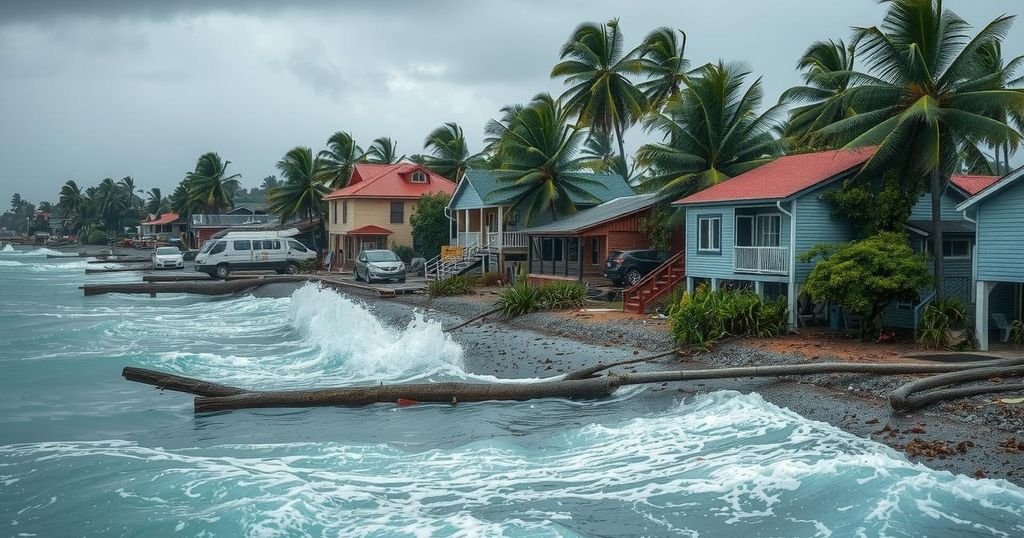Tragic Aftermath of Cyclone Chido: Mayotte Faces Unprecedented Crisis

Cyclone Chido has caused significant destruction in Mayotte, with officials warning that the death toll could reach hundreds or thousands. The cyclone, a category 4 storm, struck the island with intense winds, devastating infrastructure and informal housing. Rescue teams and supplies have been mobilized to assist the affected population as the region faces increased vulnerability during cyclone season. The storm has also impacted Mozambique, raising humanitarian concerns.
Cyclone Chido has wrought significant devastation in Mayotte, leading to an alarming death toll that officials estimate may reach several hundred or even thousands. Mayotte’s Prefect, François-Xavier Bieuville, stated that with the catastrophic impact observed, the official count of 11 deaths is highly underestimated. The cyclone, classified as a category 4 storm, unleashed fierce winds exceeding 220 kilometers per hour, creating extensive damage, especially in impoverished neighborhoods characterized by informal structures. Rescue operations have commenced, with supplies and emergency aid being dispatched from mainland France to address urgent needs such as restoring power and ensuring access to clean drinking water.
The cyclone struck Mayotte during a period of vulnerability, given its status as the poorest territory in the European Union. With a population of over 300,000, the island’s infrastructure and housing conditions left many residents unprepared for such an impactful natural disaster. The aftermath has further strained the already limited resources available for recovery and assistance. Reports indicate that extensive damage has occurred to critical infrastructure, including the airport, which now relies solely on military aircraft due to compromised control tower functionality. Local officials are prioritizing the restoration of basic services to support survival and recovery efforts.
Cyclone Chido transitioned beyond Mayotte towards Mozambique, raising concerns about potential displacement for millions affected in its path. UNICEF has flagged areas in northern Mozambique as severely impacted, with considerable destruction reported in homes and essential services. This pattern of devastation is alarming as neighboring countries prepare for similar outcomes, showcasing the pervasive threat posed by cyclones in the region, particularly during the cyclone season. The recurrent intensity of such storms is increasingly linked to climate change, showcasing the humanitarian crises that vulnerable nations endure despite contributing minimally to global warming.
Authorities, including French President Emmanuel Macron, have expressed solidarity with the affected populations, while aid efforts are underway with over 800 rescuers expected to arrive in Mayotte shortly. The current situation reflects ongoing challenges associated with natural disasters and emphasizes the importance of improved infrastructure and preparedness to mitigate future impacts. Given the region’s historical experiences with cyclones, the need for a robust support system for recovery and disaster management underscores an urgent call for international assistance.
Cyclone Chido has highlighted the vulnerabilities faced by Mayotte, a French Overseas Territory situated in the Indian Ocean and recognized as the poorest region in the European Union. With limited resources and a struggling infrastructure, Mayotte’s population is often ill-prepared for the severe ramifications of natural disasters. This cyclone brought unprecedented damage, reminiscent of past storms that have historically devastated neighboring regions, including Mozambique and Madagascar. Cyclone seasons in southern Africa have become increasingly consequential due to climate change, leading to significant humanitarian crises in areas that contribute little to global warming yet bear the brunt of its effects.
In summation, Cyclone Chido has resulted in catastrophic conditions in Mayotte, with projected death tolls far exceeding initial estimates. The island is receiving an influx of aid and emergency responders to assist in recovery efforts, reflecting the widespread damage inflicted not only on infrastructure but also on the quality of life of its residents. As the cyclone continues to pose risks to nearby countries, a global awareness and commitment to addressing climate-related disasters is essential to bolster resilience in vulnerable communities.
Original Source: www.cnn.com






